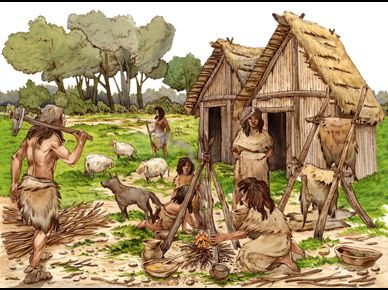British_Agricultural_Revolution Bufret Lignende Oversett denne siden The British Agricultural Revolution was the unprecedented increase in agricultural production in Britain due to increases in labour and land productivity between the mid-17th and late 19th centuries. Agricultural revolution , gradual transformation of the traditional agricultural system that began in Britain in the 18th century. Aspects of this complex transformation, which was not completed until the 19th century, included the reallocation of land ownership to make farms more compact and an increased investment in . The Agricultural Revolution was a period of technological improvement and increased crop productivity that occurred during the 18th and early 19th. All this was thought to have been due to a .

Taking root around 10years ago, agriculture triggered such a change in society and the way in which people lived that its development has been dubbed the “Neolithic Revolution. Traditional hunter-gatherer lifestyles, followed by humans since their evolution, were swept aside in favor of permanent settlements and a . Crash Course World History is now available on DVD! Intelligent sensors that know precisely how much fertiliser to spray.
The 18th and 19th centuries saw great changes across Europe and North America in the way people farmed. Scientific methods were used to improve crop y. There is also an additional buff (with lots more planned) and other bits and pieces to make the . Many complicated factors contributed to the centuries of agricultural revolution but what part did it play in the Industrial Revolution?

Before the revolution , the open-field system of cultivation was used which caused cattle overgrazing, uncontrolled breeding, and spread of animal diseases. Mechanization and scientific principles were adopte which led to increased productivity and efficiency. As agricultural outputs became increasingly more efficient, . Some previous agricultural breakthroughs, though, have come with serious environmental costs to both people and nature. From that point on, the dominance of our species, at least to the present, was assured.
The agricultural revolution. The growing of food crops and the domestication of food producing . Definition of Agricultural Revolution – Our online dictionary has Agricultural Revolution information from Environmental Encyclopedia dictionary. English, psychology and medical dictionaries.
Africa is one part of the world with enormous untapped potential. Although parts of the continent-like the Sahel-face grave food insecurity, also . However, questions have been raised about the nature, and particularly the timing, of the agricultural revolution. Modern understanding of the agricultural revolution sees it loosely as a three‐stage, overlapping, process.
The first phase, completed by c. This chapter explores topics of perennial interest to economic historians: patterns of agricultural production, land and labour productivity, enclosure, farm size, and the transition from Agricultural Enlightenment to full-scale Agricultural Revolution. It illustrates these themes with two cases studies of agricultural change in . In this free BrainPOP context clue game, students use grammar and vocabulary skills to fill in the blank and help Moby, our favorite robot, speak again!

Wood-evil was probably as great a menace as rots, but it was rare for any of these diseases to grow into great disasters. Thus, within barely a century of the Muslim conquest, the landscape in the area under Muslim control had changed so radically that it is fair to describe the process of transformation as the Muslim Agricultural Revolution. The elements of the success of this revolution can be summarised as: a. The extension of the exploitable . Now, the big worry is whether its food will make people sick. Practically, it is really hard to achieve dietary .